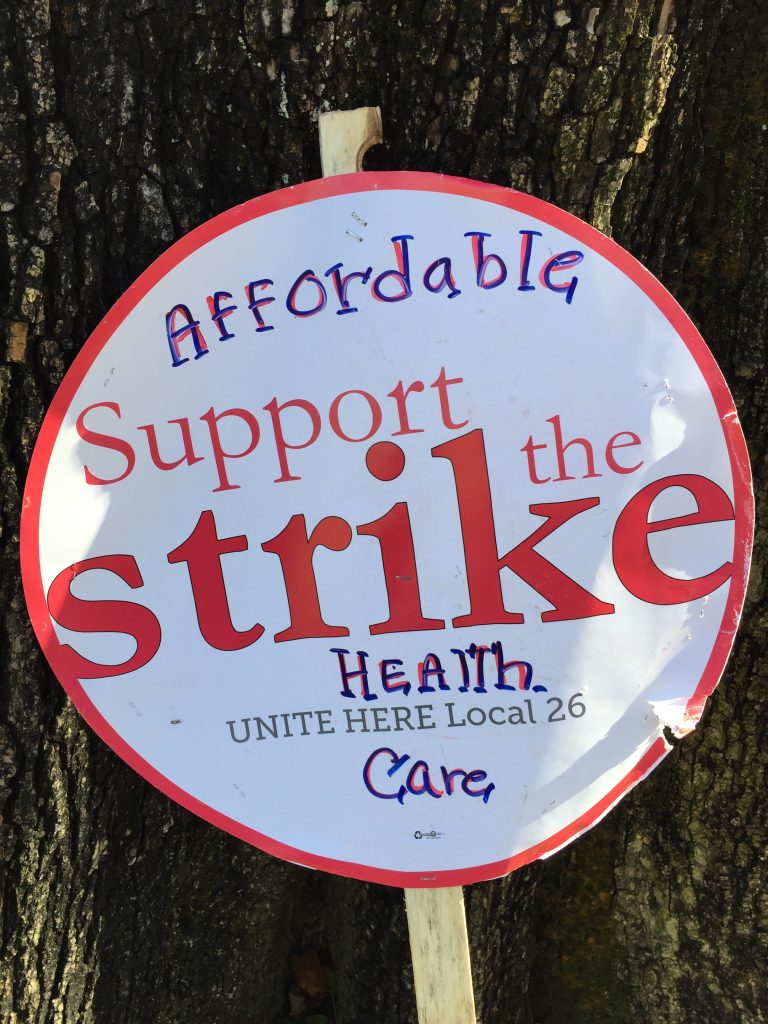“Harvard Faculty Donate to Democrats by Wide Margin” (Crimson) says that “Ninety-six percent of donations in the data set from the Faculty of Arts and Sciences, which includes Harvard College, supported Democratic efforts. That figure was even higher—nearly 98 percent—at Harvard Law School.”
As labor unions are major donors to Democratic Party candidates it seems reasonable to infer that most Harvard College and Law School faculty members advocate for workers to unionize. Certainly in private conversations with Harvard faculty members support for labor unions has been almost total. This has been true for my friends who work at other universities as well. The only exception that these folks allow is that workers (other than themselves; the AAUP functions as a union to some extent) should not be unionized at their own university and/or that the university should not have to pay what already-unionized workers are demanding. Professors tend to be especially vehement on the subject of how graduate students should not be allowed to unionize for their work as research and teaching assistants.
This week I walked from the 98-percent Democrat Law School to the 96-percent Democrat Harvard College. What did I find? A strike by Harvard’s food service workers:
What do these folks want? “Affordable health care,” according to the signs. This seems odd due to the fact that the Great Father in Washington already gave us all affordable health care via the Affordable Care Act (“Obamacare”), signed into law by President Obama in 2010. A New York Times op-ed by a striking worker explains the situation further. [If there were a strike at the New York Times itself, would the paper provide its union members with space on the front page to air demands? Or is it only newsworthy when some other enterprise faces a strike?]
I’m wondering if this strike is the harbinger of further dissatisfaction among American workers. We’ve all, apparently, voted to spend 18 percent of our GDP on health care. Yet we apparently don’t want to hand over 18 percent of our paychecks to the health care industry.
Related:
- Health care inflation in Boston (success for Union A = hardship for Union B)
- my 2009 essay on health care reform (“We now spend so much on health care that it is very likely reducing our health compared to having a minimal system. In order to pay for our health care system, Americans are forced to work 25 percent longer hours than they otherwise would.”)


If you get paid enough, any healthcare can become “affordable”.
As for the professors: I wonder if any of this is a “hazing” thing? (“I was an impoverished post-doc, so everyone should have to go through that phase”) Sort of like how doctors will swear to you that the only way to become a good doctor is to skip a few years of sleep while trying to minimize the number of people killed by the resulting brain fog.
Not sure why you’re equating salaries to GDP other than to be…oh right, this is the blog which often equates two things that have little in common other than trying to tweak people 🙂
But let’s go with this idea that there’s something magical about 18% of GDP as a basis for costing someone’s health care. (of course GDP is made up of a lot more than salaries…just saying)
I work for a large company and get a very nice health plan with low deductibles for $436.04/month for family of four. Not sure exactly how much it costs my employer but pretty sure it’s nowhere close to 18% of my salary.
Now let’s take about these food service workers. Let’s say they make $15/hour (making this up, but guessing it’s less than that). That’s $30K/year. 18% of 30K is $5400 or $450/month. That’s before taxes. Let’s say taxes are 10% (is that reasonable?) then it’s 18% of 27K or $4860/year or $405/month. Let’s say that’s for a family of four. So they’re paying out of pocket what I’m paying. And what’s left over for them to have a life is a lot less than what’s left over for me to have a life.
Three questions:
1) Does anyone reading this pay 18% of their salary for health care?
2) Can these food service workers get a reasonable health care policy that won’t bankrupt them with a huge deductible for 405/month?
3) Maybe this iswhy we have a regressive tax system…so that those who can afford to pay the most contribute the most?
The low-wage cafeteria worker who is credited with that op-ed, Rosa Ines Rivera, writes that she has two children and that she recently lost her apartment and moved back in with her mother, where she and her children share a single room.
It seems a fair inference that she has no husband, and from her discussion of her finances, no significant child-support income either.
She obviously did not read your book, or she would enticed some of the Harvard medical students she lauds in her op-ed to father her children, so she and they could all live more comfortably now.
Someone Else: Certainly she can serve as an inspiration to others that a thorough understanding of family law (e.g., from reading http://www.realworlddivorce.com/ ) can result in a much easier life trajectory. The NYT op-ed writer reports a post-tax income of about $450/week. Given that one child is 8 and the other 2 it seems reasonable to assume that there are two different fathers for these children. Under the Massachusetts guidelines if each father earned at least $1050 per week ($54,600 per year) she would end up with the same spending power ($228/week from each father, tax-free) without having to leave her apartment. With no wage income she would qualify for MassHealth (Medicaid) and not have any deductibles to pay.
Rosa Ines Rivera is an excellent writer based on her op-ed – I wonder why she works as a line cook. Or maybe she didn’t really write this herself and it’s just propaganda written by some union PR flack instead of the authentic voice of the downtrodden?
Even though the quality of her writing is excellent, her thinking is muddle headed. Free or near free health care is not a right any more than free ice cream or a free car. Your value as an employee is based on your productivity and not on how much cash your employer has in the bank. Harvard has 3x the endowment of MIT – should it pay its workers 3x as much?
It was fundamentally a mistake (created by WWII price controls which capped cash wages but not benefits and by the tax code) to create an employer paid health care system. If workers received the money their employer was spending on health care in cash, they could choose whatever out of pocket deductible they wished or pay for their health care in cash. Perhaps then they would not be so eager to have lots of unnecessary tests done (which their doctor ordered mainly so he could protect himself from future malpractice claims).
Apparently, the cafeteria workers have now agreed on a new package which will give them a salary of $35,000 per year plus health benefits (and other benefits). This works out to $16.82 per hour. Not a princely wage but I suspect better than these workers could earn doing similar work in a fast food restaurant. Plus the FF job would not come with the same benefits as the Harvard job.
Jackie: $35,000/year will be the minimum salary, not the average. See http://www.thecrimson.com/article/2016/10/27/pay-raise-harvard-huds/
Also, a Diversity and Equality Committee was formed. That will help with rising health care costs in the Boston area…
That’s a great work becuase Democrat are cleary ahead. If they elected it will make america More stronger.
That’s a great work because Democrat are clearly ahead. If they elected it will make america More stronger. Already Hillary declared that She will rearrange the Obama Health care system. So we have to be faithful and hopeful.